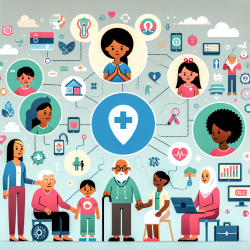Cancer care extends beyond the physical treatment of the disease; it encompasses emotional, psychosocial, spiritual, and practical aspects that significantly impact patients' quality of life. In Africa, where resources are often limited, addressing these needs becomes even more critical. A recent article titled "Competencies for Nurses Regarding Psychosocial Care of Patients With Cancer in Africa: An Imperative for Action" highlights the importance of developing specific competencies for nurses to provide effective psychosocial care to cancer patients.
The Importance of Psychosocial Care in Cancer Treatment
Psychosocial care is a vital component of comprehensive cancer treatment. It involves understanding and addressing the social, psychological, emotional, spiritual, and functional aspects of cancer care. These elements are crucial across the cancer trajectory—from prevention to bereavement. Effective psychosocial interventions can reduce emotional distress, improve quality of life, and enhance treatment compliance.
In Africa, the need for psychosocial care is pronounced due to unique challenges such as limited healthcare resources, cultural stigmas surrounding cancer, and economic barriers. Nurses are ideally positioned to deliver this care but require appropriate training and competencies to do so effectively.
Developing Competencies for Psychosocial Care
The article outlines competencies adapted from evidence-based standards for oncology nurses. These competencies aim to guide educational program planning and curriculum development for cancer nursing in Africa. They emphasize building nurses' capacity to deliver psychosocial care effectively.
- Communication Skills: Nurses must communicate empathetically and nonjudgmentally to establish therapeutic relationships with patients.
- Assessment Abilities: Identifying psychosocial distress and knowing when referrals are necessary are crucial skills.
- Emotional Support: Providing basic emotional support and connecting patients with available services is essential.
- Cultural Sensitivity: Understanding cultural contexts and barriers that affect patient care is vital for effective intervention.
Implementing Competencies in Nursing Education
The integration of these competencies into nursing education programs is crucial for improving psychosocial care delivery. Recommendations include:
- Policy Development: Incorporate oncology nursing education into national health workforce development plans.
- Faculty Training: Develop faculty capable of designing and implementing oncology nursing curricula.
- Resource Allocation: Ensure appropriate funding for educational programs focused on oncology nursing.
The Role of Research in Enhancing Psychosocial Care
Nursing research plays a pivotal role in advancing psychosocial care practices. Prioritizing research that informs clinical practice and strengthens the evidence base for culturally appropriate interventions is essential. Encouraging studies on biobehavioral interventions can further enhance the quality of psychosocial care provided by nurses.
Conclusion
The competencies outlined in the article serve as a foundation for enhancing psychosocial care in oncology nursing across Africa. By integrating these competencies into educational frameworks and encouraging ongoing research, nurses can be better equipped to meet the complex needs of cancer patients. This approach ultimately aims to improve patient outcomes and elevate the standard of cancer care across the continent.
To read the original research paper, please follow this link: Competencies for Nurses Regarding Psychosocial Care of Patients With Cancer in Africa: An Imperative for Action










